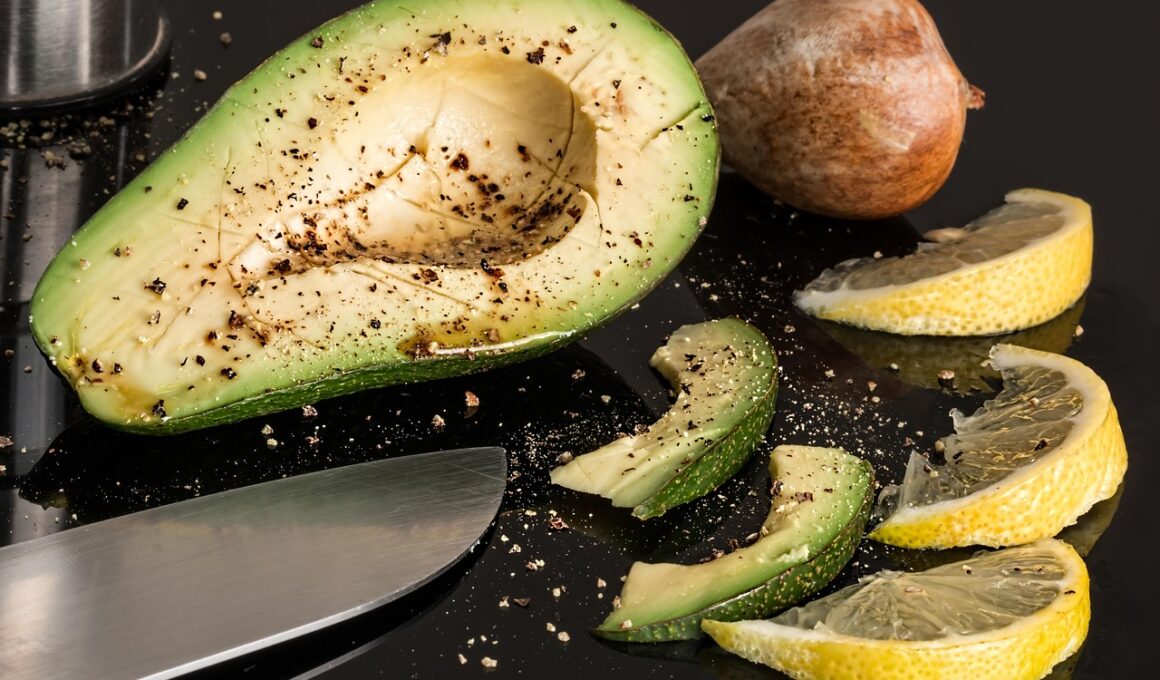Healthy Fats and Their Importance in a Rower’s Diet
Rowing is a demanding sport that requires a balanced diet for optimal performance. Healthy fats play a crucial role in providing the necessary energy and nutrients for rowers. Unlike the common misconceptions about fats, healthy fats are essential for maintaining a robust energy level. These fats can help fuel long training sessions and promote recovery afterward. It’s vital to integrate sources of healthy fats into a rower’s diet, ensuring that meals are not only nutritious but also satisfying. Foods rich in omega-3 fatty acids, such as fish, flaxseeds, and walnuts, should be prioritized. They provide anti-inflammatory properties, which is beneficial after rigorous rowing workouts. Additionally, sources of monounsaturated fats, like avocados and olive oil, contribute to heart health, which is critical for endurance sports. While high-calorie fats are often shunned, rowers need to understand the difference between unhealthy and healthy fats. This knowledge can significantly enhance their performance and overall well-being. By incorporating these dietary elements, rowers will maximize their potential and foster a sustainable approach to nutrition.
The Role of Healthy Fats in Energy Production
Healthy fats serve as a primary energy source in the diet of rowers, especially during long sessions on the water. These fats contain more than double the calories per gram compared to carbohydrates and proteins. Consuming healthy fats can meet the energy demands required to sustain intense rowing activities. Omega-3 and omega-6 fatty acids are particularly important as they contribute to energy production and muscle recovery. When rowers engage in endurance training, their bodies utilize these fats as a steady fuel source, which helps maintain endurance over prolonged periods. Including nuts, seeds, and fish in a rower’s diet supports not only energy but also aids in muscle repair post-exercise. Moreover, healthy fats help keep the body satiated, reducing the likelihood of overeating or consuming unhealthy snacks. Selecting the right type of fat is critical; rowers should focus on incorporating unsaturated and essential fatty acids into their meals. This focus allows for improved energy efficiency during demanding rowing sessions, ultimately leading to better performance outcomes.
Essential fatty acids, such as omega-3 and omega-6, are crucial for maintaining overall health. Rowers often experience inflammation from intense training, so including omega-3s helps alleviate this issue. Fatty fish like salmon provides high-quality protein and essential omega-3 fatty acids. In addition to fish, nut butter can be an excellent source of healthy fats, delivering nutrients alongside complex carbohydrates. The blend of protein and fat in meals promotes slower digestion, allowing for sustained energy release during rowing sessions. Another beneficial choice is incorporating chia seeds into smoothies or yogurt. They are rich in both fiber and omega-3s, making them a valuable addition to a rower’s breakfast. Additionally, avocados can be used as a spread on whole-grain toast or as an ingredient in salads; they provide potassium, which is important for muscle function during rowing. Rowers should experiment with various combinations of these healthy fats to find what works best for their individual nutritional needs. With the right approach, athletes can maintain energy, recover effectively, and enhance overall performance.
How to Incorporate Healthy Fats into Daily Meals
Integrating healthy fats into a rower’s diet can be simple and enjoyable. Meal planning and preparation are key strategies for ensuring that healthy fats are available when needed. For breakfast, consider adding nut butter to oatmeal or yogurt alongside fruits. This not only boosts flavor but also increases nutritional content significantly. Incorporating healthy fats into salads by using olive oil as a dressing can enhance taste while supporting cardiovascular health. For lunch, swap out regular meat for fatty fish, ensuring a good source of protein, healthy fat, and essential nutrients. Preparing grilled salmon or mackerel alongside leafy greens and quinoa makes for a well-rounded meal. Snacks should also prioritize healthy fats; choose options like trail mix, which includes nuts, seeds, and dried fruits. By being mindful during grocery shopping, rowers can stock their kitchens with healthy fat options, allowing easy access at any time. Additionally, utilizing spreads made from avocados or nut-based products can create fulfilling meals that keep energy levels stable during frequent training sessions.
Understanding the balance between carbohydrates, proteins, and fats is essential for rowers. Healthy fats should complement the intake of complex carbohydrates, which provide energy during high-volume training. Balancing these macronutrients fosters optimal body function and sustains energy. A common practice is consuming a diet comprised of 50-60% carbohydrates, 20-30% fats, and 15-25% proteins, ensuring that the required energy needs are fulfilled. Rowers need to keep in mind their individual energy output, which may vary each training session. Monitoring and adjusting fat intake depending on training intensity might be needed. Recognizing when to refuel and how to use fats to improve performance is a skill every rower should develop. This helps maintain body weight and muscle mass while optimizing health. Using smartphone apps can track macronutrient intake, making it easier to adhere to dietary goals. Combining further education on nutrition with personalized meal plans will undoubtedly improve performance on the rowing course. Healthy fats will enable rowers to train harder, recover faster, and ultimately enhance their overall performance.
Conclusion: Optimizing Nutrition for Rowers
In conclusion, healthy fats are integral for rowers at every level of competition. By prioritizing the intake of essential fatty acids, athletes can enhance their energy levels and recovery processes. This dietary focus aids in reducing injuries and maximizing training outcomes. Rowers should embrace the idea that fats do not equate to weight gain; rather, it’s essential to choose the right types of fats. Seeking guidance from sports nutritionists could provide personalized strategies tailored to individual training regimens. Nutritional education is vital for athletes, as better understanding food choices can yield significant results. Knowing when and how to consume healthy fats helps rowers to maximize their training effectiveness. Additionally, experimenting with different recipes will keep meals exciting while promoting the incorporation of healthy fats. By building a nutrition strategy that balances carbohydrates, proteins, and fats, rowers can ensure they meet their performance goals. In the competitive world of rowing, optimal nutrition can be the differentiating factor that propels athletes towards success and continued health.
Ultimately, maintaining a balanced diet rich in healthy fats is crucial for rowers looking to excel in their sport. This focus not only supports ongoing energy during rigorous workouts but also aids in recovery and overall well-being. Each rower will have different dietary needs and preferences, so experimentation is key. Incorporate various healthy fats, like avocados, nuts, and fish into daily meals, and see how they affect performance. Listening to one’s body and making adjustments accordingly will lead to better health and enhanced rowing capabilities. Always remember that nutrition is not a one-size-fits-all approach, and consistency will lead to long-term benefits. Adopting these dietary changes can certainly elevate a rower’s performance and help them reach their goals. Alongside regular training, a comprehensive understanding of nutrition will provide rowers with the tools they need to succeed. As you continue your rowing journey, prioritizing nutrition will help ensure that you are as prepared, focused, and energized as possible for each race day. Better nutrition leads to better rowing, creating an empowering cycle for every athlete.
Striving to incorporate healthy fats into your diet will take time and dedication, but the benefits will be worth the effort. As a rower, you must recognize the value of the foods you consume, as they directly impact your athletic performance and recovery. Aim to educate yourself continuously on the role of nutrients, especially healthy fats, in your diet. Spark conversations with fellow athletes and coaches about nutrition to glean insights from their experiences. Additionally, don’t shy away from seeking professional advice if needed to enhance nutritional knowledge. Meal preparation may seem tedious, but creating delicious, nutritious meals can evolve into a cherished routine. So set aside time each week to plan and prepare meals that include healthy fats in formats that appeal to your tastes. Enjoy experimenting in the kitchen and finding combinations that excite you while contributing to your well-being. Healthy fats can ultimately become the unsung heroes of a rower’s nutrition plan. The importance of adopting a positive mindset towards nutrition can create meaningful shifts, resulting in improved athletic prowess and sustained health.


